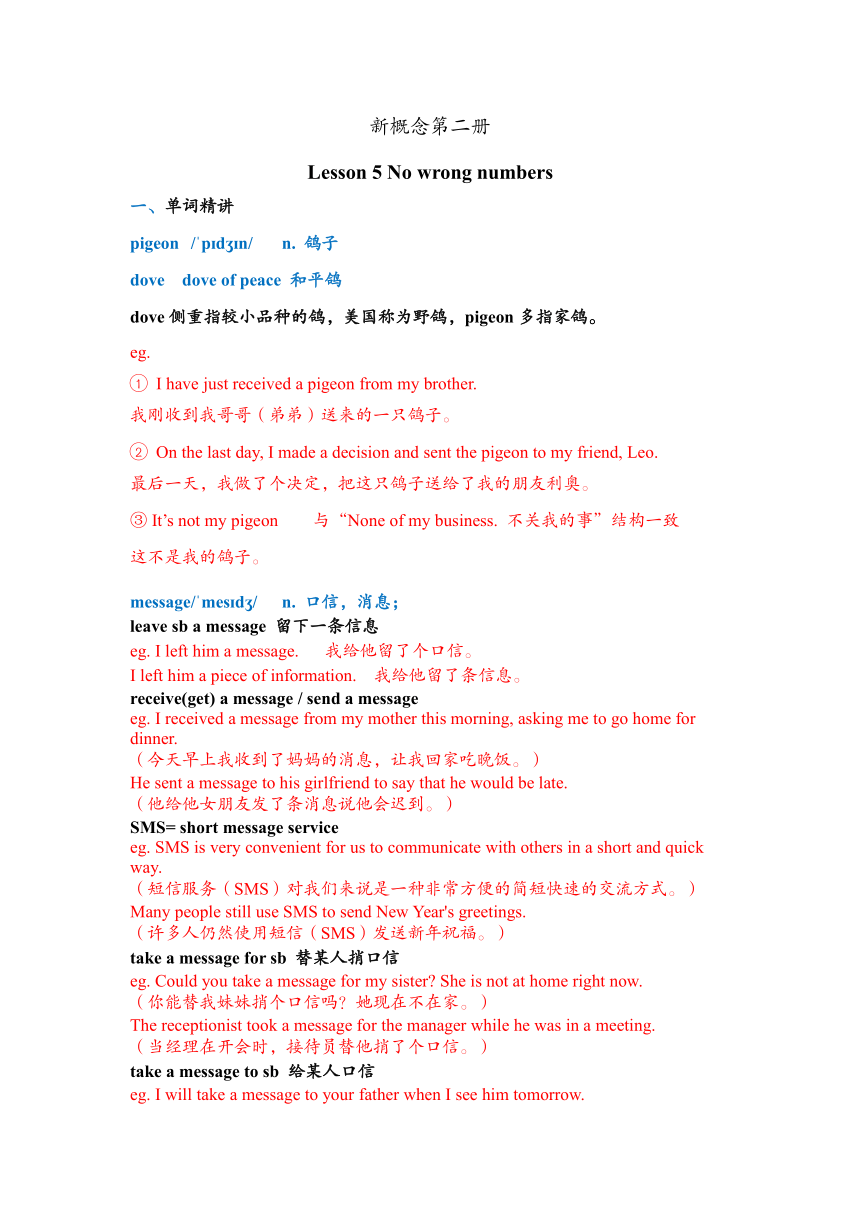
新概念第二册 Lesson 5 No wrong numbers 单词精讲 pigeon / p d n/ n. 鸽子 dove dove of peace 和平鸽 dove侧重指较小品种的鸽,美国称为野鸽,pigeon多指家鸽。 eg. I have just received a pigeon from my brother. 我刚收到我哥哥(弟弟)送来的一只鸽子。 On the last day, I made a decision and sent the pigeon to my friend, Leo. 最后一天,我做了个决定,把这只鸽子送给了我的朋友利奥。 ③ It’s not my pigeon 与“None of my business. 不关我的事”结构一致 这不是我的鸽子。 message / mes d / n. 口信,消息; leave sb a message 留下一条信息 eg. I left him a message. 我给他留了个口信。 I left him a piece of information. 我给他留了条信息。 receive(get) a message / send a message eg. I received a message from my mother this morning, asking me to go home for dinner. (今天早上我收到了妈妈的消息,让我回家吃晚饭。) He sent a message to his girlfriend to say that he would be late. (他给他女朋友发了条消息说他会迟到。) SMS= short message service eg. SMS is very convenient for us to communicate with others in a short and quick way. (短信服务(SMS)对我们来说是一种非常方便的简短快速的交流方式。) Many people still use SMS to send New Year's greetings. (许多人仍然使用短信(SMS)发送新年祝福。) take a message for sb 替某人捎口信 eg. Could you take a message for my sister She is not at home right now. (你能替我妹妹捎个口信吗?她现在不在家。) The receptionist took a message for the manager while he was in a meeting. (当经理在开会时,接待员替他捎了个口信。) take a message to sb 给某人口信 eg. I will take a message to your father when I see him tomorrow. (当我明天见到你父亲时,我会给他带个口信。) The postman took a message to the old lady who lived alone. (邮递员给那位独自居住的老太太带了个口信。) message和information 辨析 message和information的区别:message通常是指口头或书面上的“消息;信息” 等,information侧重指在阅读、观察或谈话中了解到的“信息、消息、情报”等。 a piece of information. eg. She left a message on my desk, asking me to call her back as soon as possible. (她在我桌上留了个消息,让我尽快给她回电话。) This book contains a great deal of useful information about history. (这本书包含了大量关于历史的有用信息。) cover / k v (r)/ v.行走(一段路程);越过 vt. 行过(一段距离),走过(通常不用被动语态) cover + 距离 eg. The bird covered the distance in three minutes. 这只鸟在三分钟内飞完了这段距离。 句型转换,对主语提问时不用变一般疑问句形式 eg. Who covered the distance in three minutes 谁在三分钟内跑完(走完、飞过等,根据上下文确定具体动作)这段距离 vt. 盖,覆盖 eg. Snow covered the whole village. 雪覆盖了整个村庄。 n. 覆盖物,盖子,罩子,套子 eg. Put a cover on the box!给这个盒子盖上盖子! distance / d st ns/ n.距离 一般以ce 结尾的 通常是名词,ce变为t,整个单词就变成了形容词, 例如 distance - distant difference - different importance - important request n. 要求,请求 send a request for … 请求要… eg.I have just sent a request for a new computer. 我刚刚发送了一份申请新电脑的请求。 refuse the request 拒绝请求 request sb to do sth = ask sb to do sth 要求某人做某事 ... ...
~~ 您好,已阅读到文档的结尾了 ~~

